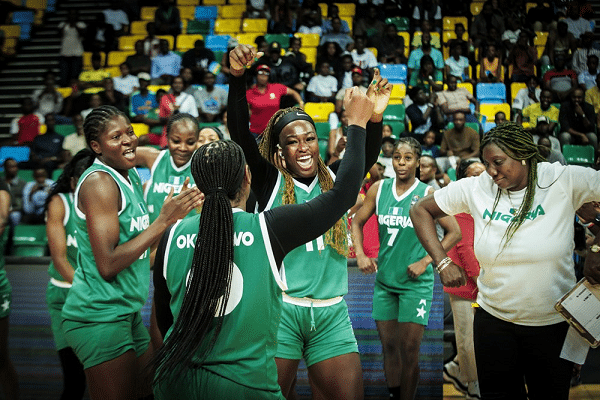Editorial
Kudos S’Falcons, D’Tigress

Sports in Nigeria, particularly in the women category has been in the news within and outside
the country following the recent exploits of the country’s women football team, the Super Falcons and the basketball team, D’Tigress. The Super Falcons were one of the five flag bearers for Africa at the ongoing ninth FIFA Women’s World Cup in Australia and New Zealand. Though they went to the women’s mundial, saw, impressed but failed to ultimately conquer, they exited after proving to be the best continental representatives and paradoxically, managed to win the hearts of Africa and world football fans.
Coming on the heels of Super Falcons’ impressive showings at the World Cup was the exhilarating triumph of D’Tigress in the 2023 FIBA Women’s Afrobasket tournament in Rwanda. The women basketballers mastered all opponents at the tournament including hosts Rwanda, culminating in the exciting 84 points to 74 victory over a strong Senegalese team in the final match. The victory by D’Tigress is historic as the Nigerian Ladies have become only the second team ever after Senegal to win four consecutive titles.
The victory followed earlier ones in 2017, 2019 and 2021 after waiting for solid 12 years to rule Africa. Interestingly, the Coach of D’Tigress, Rena Wakama is the first female coach to win the Afrobasket title and with her in charge, we think that there is room to dream of bigger things in the days ahead; especially with the Olympic qualifiers around the corner.
Indeed, not many Nigerians and keen observers gave the Super Falcons and this current set of D’Tigress, largely made up of rookies and a couple of experienced players a chance to make impact at their respective tournaments. But they rose above their critics, handicaps and adversities to not only put smiles on the faces of Nigerians with their performances, they showed that they have what it takes to mix it with the world’s best at the highest level.
That is why we believe that it is pertinent to commend the teams and encourage them palpably. Their performances have demonstrated that women and girls can thrive in every area of human endeavour.
For the Super Falcons, the turmoil preceding the finals was embarrassing, and a group-stage exit was anticipated. Three games later, the Super Falcons had reason to smile. They did not only navigate a presumed group of death, consisting top 10 side, Australia, Olympic Champions, Canada and a rugged debutants, Republic of Ireland without losing a match, they showed the true African determination and resilience that belied their FIFA world ranking.
After reaching the knock out stage in back-to-back championships after their 2019 showing in France and going toe-to-toe with and holding European champions, England to a barren score within regulation and extra time, the gallant Falcons bowed out to the lottery of penalty shoot- out.
Indeed, the energy and intensity demonstrated by the team throughout their time at the World Cup had not been on show at any tournament in recent times. Though they bowed out and failed to reach the ultimate prize, they were not losers at all.
Already, many Nigerians are celebrating the performance and achievement of the women. From the National Assembly to sports fans on the street, it has been encomiums for the teams. Only on Monday, the First Lady, Mrs Oluremi Tinubu hosted the Super Falcons in Abuja and praised them for their outing. We join the teeming Nigerians in congratulating and commending the Super Falcons and D’Tigress.
However, we think that they deserve some measure of reward and awards. This, we believe, would go a long way to sustain their patriotic appetite, thirst for hard work and sacrifice for national causes. It also behoves the Nigeria Football Federation, NFF and their Basketball counterparts, NBBF to learn from the experience, try to effect the best practices at all times and give the teams the needed preparation and support to excel.
The Super Falcons and D’Tigress have shown that with the requisite environment and motivation, the country has the manpower and talent to rule the world in sports.
Editorial
Beginning A New Dawn At RSNC

Editorial
Sustaining OBALGA’s Ban On Street Trading

Editorial
AFCON ’25: Bravo, Super Eagles, But…

-
Maritime2 days ago
Nigeria To Pilot Regional Fishing Vessels Register In Gulf Of Guinea —Oyetola
-
Maritime2 days ago
Customs Declares War Against Narcotics Baron At Idiroko Border
-

 Sports2 days ago
Sports2 days agoGombe-Gara Rejects Chelle $130,000 monthly salary
-
Maritime2 days ago
NIMASA,NAF Boost Unmanned Aerial Surveillance For Maritime Security
-

 Sports2 days ago
Sports2 days agoTEAM RIVERS SET TO WIN 4×400 ” MORROW” …Wins Triple jump Silver
-
Maritime2 days ago
NIWA Collaborates ICPC TO Strengthen Integrity, Revenue
-

 Sports2 days ago
Sports2 days agoNPFL Drops To 91st In Global League Rankings
-

 Sports2 days ago
Sports2 days agoNSC eyes international hosting rights

